
The head of St. John the Baptist is a tondo painting by the Italian Renaissance master Giovanni Bellini. It is now housed in the Civic Museum of Pesaro.

The Barbadori Altarpiece is a painting by Filippo Lippi, dated to 1438 and housed in the Louvre Museum of Paris. It is a sacra conversazione that contains flow between each figure to depict a coronation.

The San Cassiano Altarpiece is a painting by the Italian Renaissance master Antonello da Messina, dating to 1475–1476. Commissioned for the church of San Cassiano in Venice, it was disassembled in the early 17th-century and the reunited central portion is now housed in the Kunsthistorisches Museum in Vienna. It was one of the most influential paintings in the Veneto area of the time.

The Altarpiece of Saints Ursula, Martin and Anthony is a reredo by the Spanish late Gothic painter Gonzalo Pérez, dating to 1420 and housed in the Museu de Belles Arts of Valencia, Spain.

Delivery of the Franciscan Rule is a painting by the Italian early Renaissance artist Colantonio, dating from 1445 and housed in the Capodimonte Museum of Naples.

Portrait of a Man is an oil painting by the Italian Renaissance artist Antonello da Messina, dated to c. 1475–76, and now in the National Gallery, London. It was printed on the Italian 5,000 lire note issued from 1979 to 1983.
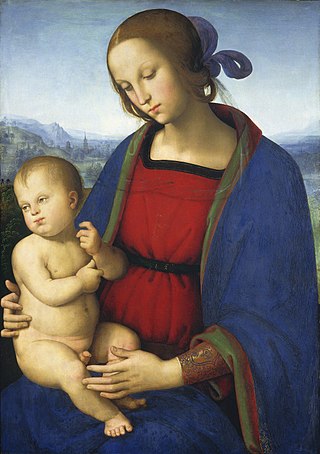
Madonna and Child is an oil on oak panel painting by Perugino. It dates to around 1501 and is now in the National Gallery of Art in Washington.
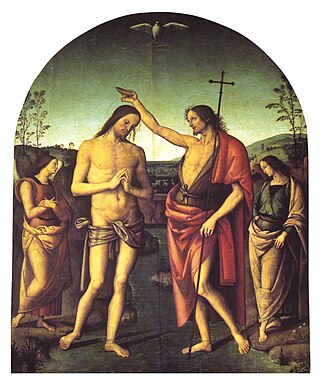
Baptism of Christ is a c.1510 painting of the Baptism of Christ by Pietro Perugino. He produced it for the chapel of St John the Baptist in Città della Pieve Cathedral, where it still hangs. Unusually for a depiction of this subject, it does not show the face of God the Father. A multi-coloured marble frame was added in the Baroque period and a copy of Perugino's self-portrait now hangs another wall in the chapel.

Mary Magdalene is an oil on panel painting of Mary Magdalene, dating to around 1500 and now in the Galleria Palatina in Florence - it has featured in its inventory since 1641. It is now attributed to Perugino. It is modelled on his wife Chiara Fancelli, who also modelled for several of his Madonnas. It is comparable to his Madonna and Child with St John the Baptist and St Catherine of Alexandria (Louvre), of similar date and with a similar dark background.
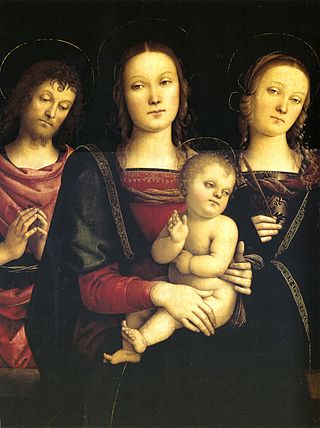
Madonna and Child with St John the Baptist and St Catherine of Alexandria is a c.1495 oil on panel painting by Perugino of the Madonna and Child with John the Baptist and Catherine of Alexandria. It is now in the Louvre in Paris.

Madonna and Child with Two Saints is a tempera on panel painting by Perugino, dating to around 1495. It is now in the Kunsthistorisches Museum in Vienna. The saint to the right is Catherine of Alexandria, whilst the saint to the left is unidentified but may be Rose of Viterbo or Mary Magdalene.

Madonna and Child with the Infant John the Baptist is an oil on oak panel painting by Perugino, dating to around 1497 and now in the Städel Museum in Frankfurt-am-Main

Portrait of a Boy is a 1495 oil on panel portrait, now in the Uffizi in Florence. In the past it has been attributed to Lorenzo di Credi, Viti, Jacopo Francia, Raphael and others, but Giovanni Morelli's reattribution of it to Perugino is now widely accepted. Although the lack of a landscape background is unusual for this painter, the style is typical of his portrait technique.

Madonna and Child with St John the Baptist and St Augustine is a c.1494 painting by Perugino of the Madonna and Child enthroned between John the Apostle and Augustine of Hippo. It is in the church of Sant'Agostino in Cremona. It was commissioned in 1493 by the rich Roncadelli family, and the following year he painted it at his Florence studio before shipping it to Cremona. It is signed and dated on the throne Petrus Perusinus pinxit MCCCCLXXXXIIII.
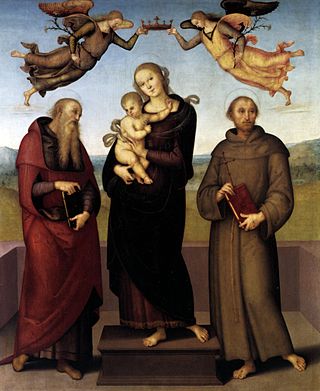
The Madonna of Loreto is a c.1507 oil on panel painting by Perugino, now in the National Gallery, London, which bought it in 1879. It shows the Madonna and Child flanked by Jerome (left) and Francis of Assisi (right). Two angels hover over Mary's head holding a crown. It reuses the low parapet from Madonna and Child with St Rose and St Catherine (1492) and probably also involved the master's studio assistants.

Saint Jerome in His Study is a c. 1445–1446 painting by Colantonio, a painter active in Naples between 1440 and around 1470. It shows the strong influence of contemporary Flemish and French art on the painter and originally formed part of a multi-panel altarpiece for the church of San Lorenzo Maggiore, later split up. The painting's dimensions are 151 centimetres (59 in) by 178 centimetres (70 in).

Adoration of the Magi is a c.1516-1519 painting by Cesare da Sesto, produced during his stay in Messina. It was commissioned by the Congrega di San Niccolò dei Gentiluomini as the high altarpiece for that church. After the church was suppressed at the end of the 18th century, it joined the Bourbon collections and was taken to Naples, where it was displayed in the Quadreria of the Palazzo di Capodimonte and later the Real Museo in the former Palazzo degli Studi. It is now in the National Museum of Capodimonte in Naples.

Saint Matthew and the Angel is an oil on canvas painting by Giovanni Gerolamo Savoldo, executed c. 1530-1535, depicting Saint Matthew, now in the Metropolitan Museum of Art, in New York. It was a major influence on the young Caravaggio.

Christus Dolens or Christ as the Man of Sorrows is a tempera-on-panel painting by the Italian Renaissance painter and architect Bramantino, executed c. 1490, in the Museo Thyssen-Bornemisza in Madrid. The original Thyssen-Bornemisza Collection acquired it in 1937 from Countess Teresa Soranza-Mocenigo. A similar work by Bramantino is in the Museo della Certosa in Pavia.
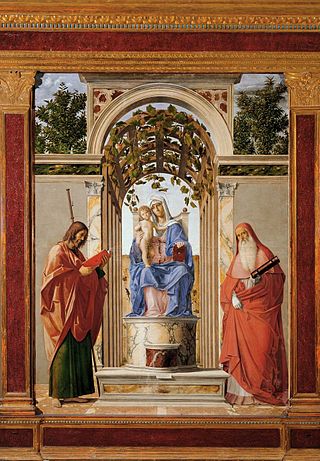
Madonna and Child Enthroned with Saint James and Saint Jerome is a 1489 oil painting by Cima da Conegliano, originally painted on panel and later transferred to canvas. It shows James the Great and Jerome either side of an enthroned Madonna and Child and now hangs in the Pinacoteca civica in Vicenza, housed in the Palazzo Chiericati.
























